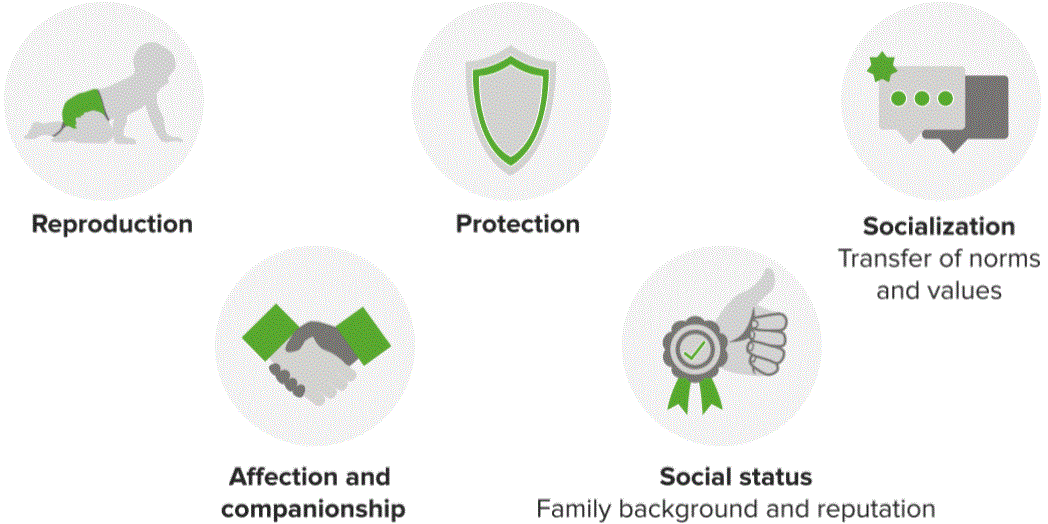Playlist
Show Playlist
Hide Playlist
Family – Social Institutions (PSY, SOC)
-
Slides Social Institutions UnderstandingSocialStructure.pdf
-
Reference List Psychology and Sociology.pdf
-
Download Lecture Overview
00:00 Now, let’s take a look at our Family. 00:03 A Family maybe define as a set of people related by blood, by marriage, adoption or another relationship with some other responsibility following on each other. 00:13 These are different forms of kinship. 00:15 We have your traditional mother-father family with your brothers and sisters and so on. 00:19 But you can have perhaps your grandparents taking care of you. 00:22 You could be adopted, you could have a mixed family with a whole bunch of individuals living under one roof. 00:28 but the idea is there's some form of support and responsibility that is shared. 00:34 Now, the Nuclear Family consist of direct blood relations. 00:38 This is your brother, your sister, your mom and your dad. 00:41 And then you can have an Extended Family with your grandparents, aunts and uncles. 00:44 So still related, still part of your family but that would be extended and the nuclear is your immediate mom and dad, brother and sister family. 00:53 So what are the five functions of the family? I think a lot of this will be straightforward. 00:57 So it should be pretty easy to kind of grasp of this and understand it. 00:59 But the first is in terms of reproduction. 01:01 So you want to sort of further your family line, further your family genes as humans, as animals on this planet are one of the goals of success, one of the… sorry the marker of success is always reproduction. 01:13 The second is as a unit you are able to protect one another, you being by yourself versus you being with two or three others creates some form of protection. 01:21 Socialization. This allows either to transfer of norms and values from your parents, your culture to be inputted into you. 01:28 So you learn a lot like I said, in how they interact with others. 01:31 what is acceptable? what is unacceptable? and this is very culturally specific. This is also very geographically specific. 01:39 So what’s normal social norms in Canada versus Germany, versus Italy versus India versus China. 01:48 it’s all different but the idea is that the family will input and carry that transfer of information on to you. 01:55 Affection and Companionship. 01:57 We all need hugs. We all need hugs and kisses. So who better than your family. 02:01 And then this is another point that might not be so obvious but I think is definitely in practice and that’s Social Status. 02:08 So your family and your family background can have a huge role in terms of the socioeconomic status that we said. 02:15 and also in your ability and access to… sorry in your access to things like healthcare, education, social services. 02:23 So simply put straightforward, if you come from an affluent family and you’re born to that in a highly reputable family then that will put you in a certain place on the SES ladder versus if you come from a broken home, broken family, not lots of education, not great jobs, you’re a little bit lower on the SES scale that impacts lot of different health and social outcomes. 02:47 Now, diversity in the family forms refers to all the various types of the family that we can have. 02:54 Like I mentioned we have your traditional, your straightforward, boring mom and dad and simple kids, you can have mixed, you can have nowadays with broken families and remarriages. You can have mixed. 03:04 So you have kids coming from the first marriage, from both sides. 03:08 and this is the second marriage and so you have a mixed family. 03:10 You can have gay, a lesbian unions, you can have grandparents a lot of different options. 03:15 So one of the drivers are behind the mixed families is divorce which has become much more common versus say 30, 40 years ago. 03:23 And in North America especially has been become quite common and has led to more remarriages and mixed families. 03:30 Violence is another aspect within family that can have a huge impact on your siblings, on other family members. 03:36 and it does have a huge impact on personality and behaviors as well.
About the Lecture
The lecture Family – Social Institutions (PSY, SOC) by Tarry Ahuja, PhD is from the course Understanding Social Structure.
Included Quiz Questions
What represents a sibling relationship?
- A nuclear family member
- An extended family member
- A peer
- A primary group
- A mixed family member
Which action is a function of a family?
- Determining social status
- Teaching universal emotions
- Providing help in emigration
- Withholding love
- Limiting support and teaching independence
Customer reviews
5,0 of 5 stars
| 5 Stars |
|
5 |
| 4 Stars |
|
0 |
| 3 Stars |
|
0 |
| 2 Stars |
|
0 |
| 1 Star |
|
0 |




